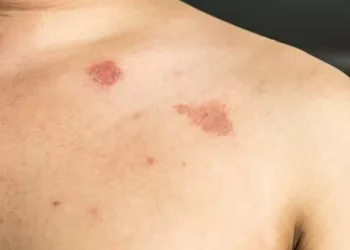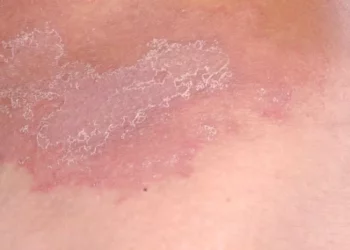Ringworm, despite its misleading name, is not caused by a worm but is actually a fungal infection. Scientifically known as dermatophytosis, ringworm is a common condition affecting the skin, scalp, hair, and nails. It is caused by a group of fungi called dermatophytes that thrive on keratin, a protein found in the outer layer of the skin, hair, and nails. This infection is highly contagious and can affect individuals of all ages, though it is particularly common in children.
The name “ringworm” comes from the characteristic ring-shaped rash that often appears on the skin when infected. This rash typically has a red, inflamed border with a clearer center, creating a ring-like appearance. While the rash is the most noticeable symptom, the infection can manifest differently depending on the area of the body affected, such as the scalp, feet, or nails.
SEE ALSO: How Does Ringworm Spread?
Causative Agent:
Identify the Fungus:
Ringworm is caused by a type of fungus known as dermatophytes. There are several species of dermatophytes, but the most common ones responsible for ringworm in humans belong to the genera Trichophyton, Microsporum, and Epidermophyton. These fungi are highly adaptable and can survive on various surfaces, making them effective at spreading from person to person or from animals to humans.
Explain How the Fungus Infects:
Dermatophytes infect the outermost layer of the skin, hair, and nails by feeding on keratin. They thrive in warm, moist environments, which is why areas of the body that are often damp, such as the feet (leading to athlete’s foot) or the groin (resulting in jock itch), are particularly susceptible. The fungus begins by invading the stratum corneum, the top layer of the skin, and then spreads outward, forming the characteristic ring-like lesions. The infection can also spread deeper into the hair follicles or nails, causing more severe symptoms.
Modes of Transmission:
Direct Contact:
The most common way ringworm is spread is through direct skin-to-skin contact with an infected person or animal. This means that simply touching the affected area of someone who has ringworm can transmit the infection. This mode of transmission is particularly common in settings where close physical contact occurs, such as schools, sports teams, and households.
Indirect Contact:
Ringworm can also be spread through indirect contact with objects or surfaces that have been contaminated by the fungus. Items like towels, clothing, combs, bedding, and even gym equipment can harbor the dermatophytes if they have come into contact with an infected person or animal. Sharing personal items, especially those that come into contact with the skin, can significantly increase the risk of transmission.
Animal-to-Human Transmission:
Animals, particularly pets like dogs and cats, as well as farm animals such as horses, can be carriers of the fungi that cause ringworm. Even if an animal doesn’t show visible signs of infection, it can still spread the fungus to humans through direct contact. This is why ringworm is more common in individuals who have regular interaction with animals, especially those who work in veterinary care or animal shelters.
Soil and Environment:
Some species of dermatophytes can live in soil, and while this is a less common mode of transmission, it is possible to contract ringworm through direct contact with contaminated soil. This type of transmission is more likely in people who spend a lot of time gardening or working in environments where soil is a constant presence.
Risk Factors:
Weak Immune System:
Individuals with weakened immune systems are more susceptible to ringworm infections. This includes people with conditions like HIV/AIDS, those undergoing chemotherapy, or those who are taking immunosuppressive drugs. A weakened immune system may not effectively combat the fungal infection, making it easier for the dermatophytes to take hold and spread.
Warm and Humid Climates:
Dermatophytes thrive in warm and humid environments, making people living in tropical or subtropical regions more prone to ringworm infections. Additionally, during the summer months, when sweating and humidity levels are higher, the risk of contracting ringworm increases, particularly in areas of the body that remain moist, like the feet or groin.
Contact with Infected Individuals or Animals:
Frequent contact with individuals or animals known to have ringworm significantly raises the risk of infection. This is especially true in communal settings such as schools, daycare centers, or sports teams, where physical contact is common, and shared spaces or items may be contaminated.
Sharing Personal Items:
Sharing personal items that come into contact with the skin, such as towels, razors, clothing, or hairbrushes, can facilitate the spread of ringworm. These items can easily become contaminated with the fungus, and sharing them creates a direct pathway for the infection to spread from one person to another.
Prevention:
Personal Hygiene:
Maintaining good personal hygiene is crucial in preventing ringworm. Regular handwashing, showering after physical activities, and keeping the skin clean and dry can help reduce the risk of infection. It’s particularly important to dry off thoroughly after bathing, as dermatophytes thrive in moist environments.
Avoid Contact with Infected Individuals or Animals:
If you know someone has ringworm, it’s important to avoid direct contact with them until they have been treated. Similarly, if a pet shows signs of ringworm, such as hair loss or scaly patches, it should be treated by a veterinarian promptly to prevent spreading the infection to humans.
Proper Sanitation:
Disinfecting shared items like towels, gym equipment, or bedding is essential to prevent the spread of ringworm. Washing items in hot water and using antifungal sprays on surfaces can help kill any lingering dermatophytes and reduce the risk of transmission.
Treating Pets:
Pets with ringworm should be treated immediately to prevent the infection from spreading to humans. Veterinary treatment may involve antifungal medications, shampoos, or topical creams. Additionally, limiting the pet’s contact with humans and other animals until the infection is cleared can help contain the spread.
Medical Advice:
Importance of Diagnosis:
If you suspect you have ringworm, it’s important to seek a professional diagnosis to confirm the infection and rule out other skin conditions. While ringworm is relatively easy to identify due to its characteristic appearance, a healthcare provider can perform tests to confirm the diagnosis and ensure that the appropriate treatment is administered.
Treatment Options
Ringworm is usually treated with antifungal medications, which may be applied topically or taken orally, depending on the severity of the infection. Early treatment can prevent the infection from spreading and help alleviate symptoms more quickly. It’s essential to follow the treatment regimen prescribed by a healthcare provider to ensure complete recovery and to prevent the infection from recurring.
Consultation with a Doctor:
If you or someone you know is experiencing symptoms of ringworm, consulting a doctor or dermatologist is crucial. A healthcare professional can provide an accurate diagnosis, recommend effective treatment options, and offer advice on how to prevent the infection from spreading to others.
In conclusion, ringworm is a common and highly contagious fungal infection, but with proper hygiene, prevention, and timely medical treatment, it can be effectively managed. Understanding the causes, modes of transmission, and risk factors can help individuals protect themselves and others from this easily preventable condition.
Related Topics:



























